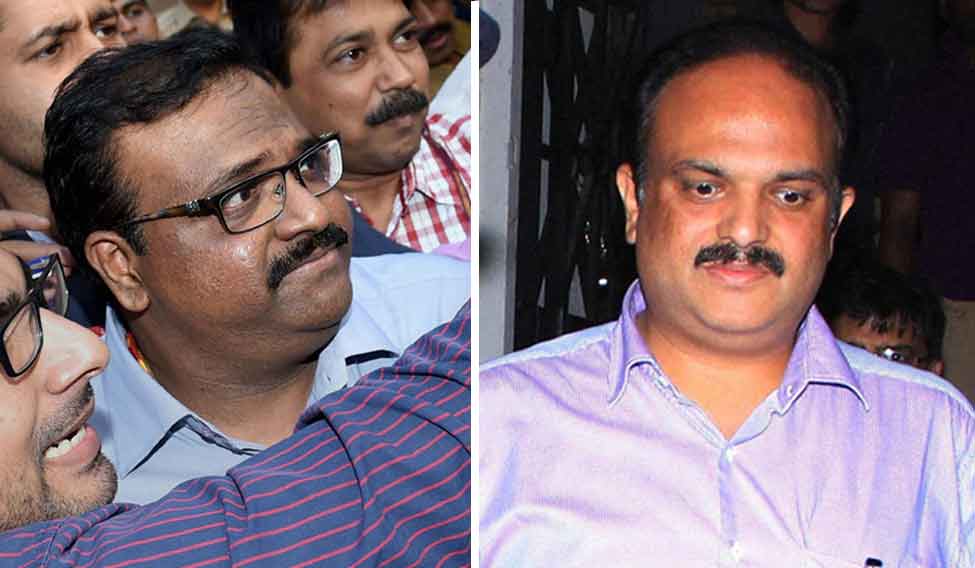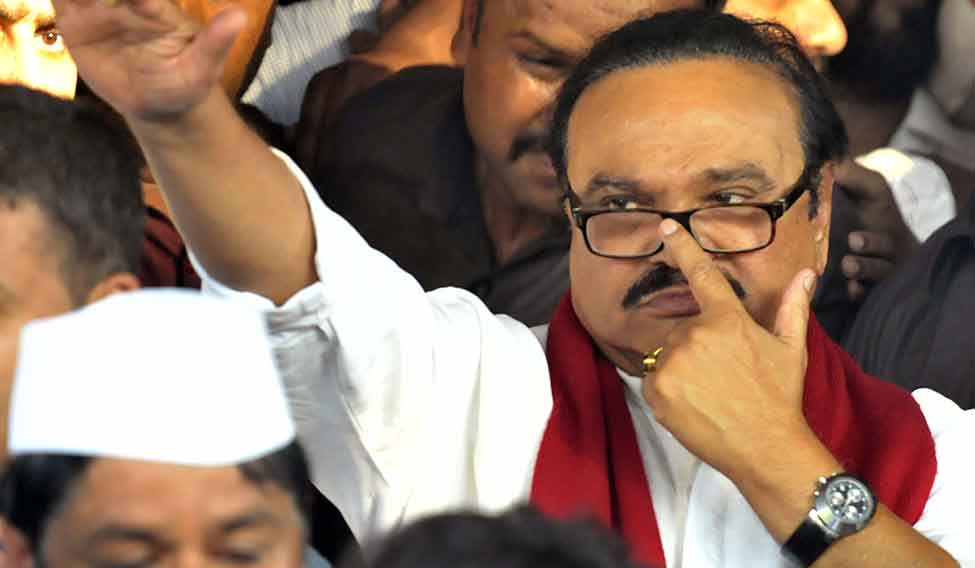The Bhujbals of the Nationalist Congress Party are known for their disdain for the law. The law, however, is now catching up with the family. On March 14, the Enforcement Directorate arrested former Maharashtra PWD minister Chhagan Bhujbal under the Prevention of Money Laundering Act for his alleged involvement in a scam pegged at Rs 870 crore. The ED had earlier arrested his nephew Sameer, a former MP, under the same act. On February 9, the ED interrogated Bhujbal's son Pankaj, a legislator, for nine hours and confiscated his passport.
An ED joint director said the agency had a watertight case against the Bhujbals. “We need to ascertain and unravel the sources of the funds generated by the family and the money laundering aspects of the case,” he said. The ED issued summons to Bhujbal for questioning him on March 14 and arrested him after nine hours of interrogation.
Bhujbal has been on the radar for a while. In December 2014, the Bombay High Court asked the Mumbai Anti Corruption Bureau and the ED to form a special investigation team to probe the allegations against the Bhujbals on a public interest litigation filed by Aam Aadmi Party leaders Preeti Menon, Anjali Damania and Sanjay Parmar. “A thorough and complete probe should get to the bottom of the matter. Whatever primary evidence we could gather we handed it across to the probing agencies,” Menon told THE WEEK. In April, 2015, the court asked ACB to lodge an FIR against Sameer and Pankaj.
The case started gathering steam after the ACB registered three FIRs. Later, the ED began investigating the money laundering part. It has registered two Economic Case Information Reports (MBZO/ECIR/07/2015 and MBZO/ECIR/08/2015, both dated June 6, 2015) against the Bhujbals and Chamankar Enterprises under the Prevention of Money Laundering Act. Chamankar Enterprises, Devisha Infrastructure and Parvesh Constructions are the Bhujbals' main companies.
On January 15 this year, Kirit Somaiya, MP, of the BJP said in a letter to Chief Minister Devendra Fadnavis that several transactions by a host of companies owned by the Bhujbals were “dubious” and “parking of kickbacks” was visible.
In a written statement in the winter session of Parliament, Jayant Sinha, minister of state for finance, said the ED had initiated investigation against Bhujbal, Pankaj, Sameer, certain PWD officials and Chamankar Enterprises. “The entities which have subscribed to the companies controlled by the Bhujbals were dubious companies which existed only on paper and their transactions were not genuine transactions,” said Sinha.
 Sameer and Pankaj Bhujbal: The ED arrested Sameer and has confiscated Pankaj's passport | PTI
Sameer and Pankaj Bhujbal: The ED arrested Sameer and has confiscated Pankaj's passport | PTI
The main charge against the Bhujbals is that they are in possession of properties bought with funds generated through illegal and criminal activities. “The proceeds of the crime is pegged at Rs 870 crore,” said an ED official. “Of this, we have already recovered Rs 114 crore. Also, we have attached four properties belonging to the Bhujbals.” Documents in possession of THE WEEK reveal that money had been laundered in the guise of equity subscription at unreasonably premium rates with the help of some market operators and chartered accountants.
The list of allegations against the Bhujbals is pretty long. It includes embezzlement in the Maharashtra Sadan project in Delhi, Mumbai-Nashik toll road, Kalina library project and redevelopment of a colony in Bandra, and routing of kickbacks through some 400 bogus companies. In Rohinjan village in Kharghar, the Bhujbals were in a housing project called Hex World. The project was launched by Devisha Infrastructure Private Limited, which has Pankaj, Sameer, Rajesh Dharap, Satyen Kesarkar and Amit Balraj as directors. The company has not started work on the project even though booking fees were collected as early as 2009. The company now wants to cancel the bookings and refund the money.
The aggrieved customers say it is a ploy to resell the flats at the current market rate. Yunus Abdul Rehman of Chembur, who had put money in the project, lodged a complaint with the Taloja police station. Later, the Navi Mumbai crime branch carried out its own investigations. Now the ED has attached the 25-acre plot.
“Sameer was the key player in all this,” said Hiten Venegavkar, the ED's lawyer. “He was the main person who decided on all matters pertaining to the affairs of the companies controlled by the Bhujbals. When asked to explain the nuances of certain financial transactions, Sameer, instead of cooperating with the probe agency, tried to shift the blame to his chartered accountant.”
The ED built the case against Sameer after interrogating several directors of companies owned by the Bhujbals—Sanjay Joshi, Tanvir Shaikh, Geeta Joshi, Nimesh Bendre and Rajesh Dharap. Sunil Naik, the Bhujbals' chartered accountant, admitted in his deposition that shares of Parvesh Constructions Private Ltd and Armstrong Energy Private Ltd were sold to dubious entities against cash at an unrealistic premium of Rs 990 a share.
The ED found that some shareholding entities of Bhujbal companies do not exist. Kotak Mahindra Bank in an email on July 16, 2015, told the ED it could not verify the addresses of some shareholding entities. In an email dated August 1, 2015, Union Bank of India informed the ED that two shareholding entities of Bhujbal companies did not carry out any business activities at their declared addresses.
According to a document in possession of THE WEEK, Suresh Jajodia, a market operator known to the Bhujbals, said he was instructed by Sunil Naik to arrange funds in the bank accounts of Parvesh Constructions and Armstrong Energy against cash. Jajodia told ED officials that he “used to receive cash” from the Bhujbals' office at Bandra and “transfer it to Kolkata-based contacts by using the services of certain domestic hawala operators”.
Sanjiv Jain, a Kolkata-based financial consultant, told investigators that he had received Rs 8 crore in cash from Naik for arranging for cheque payments in the accounts of the two companies run by the Bhujbals “in the guise of share purchase at high premiums”.
ED officials said interrogation of some of Sameer's key associates was necessary to unravel his modus operandi. But most of them have absconded. The agency fears that the Bhujbals might influence key witnesses.
WITH DNYANESH JATHAR







